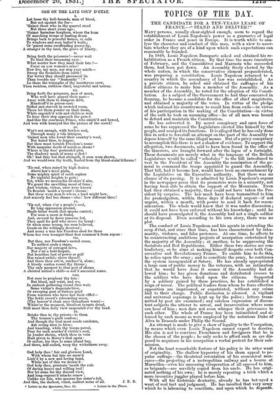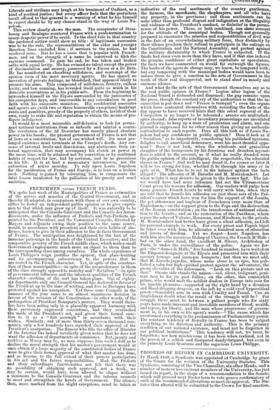TOPICS OF THE DAY.
THE CANDIDATE FOR A TEN-YEARS LEASE OF FRANCE.—" STAND AND DELIVER!"
MANY persons, usually clear-sighted enough, seem to regard the establishment of Louis Napoleon's power as a guarantee of legal order in France and peace in Europe. It is worth while to ana- lyze the character and conduct of this man' with a view to ascer- tain whether they are of a End upon which such expectations can reasonably be founded.
In 1848, Louis Napoleon Bonaparte asked and obtained his re- habilitation as a French citizen. By that time the mere emeutiers of February, and the Caussidieres and Marrasts who succeeded them, had been put down. An Assembly freely elected by the whole nation, in which the conservative element preponderated, was preparing a constitution. Louis Napoleon returned to a country in which the ascendancy, of law was reestablished. As a private citizen, he asked and obtained the suffrages of his fellow citizens to make him a member of the Assembly. As a member of the Assembly, he voted for the adoption of the Consti- tution. As a subject of the Government he had thus concurred in framing, he became a candidate for the office of chief magistrate, and obtained a majority of the votes. In virtue of the pledge which induced his countrymen to recall him from exile—in virtue of his participation in the making of the Constitution—in virtue of the oath be took on assuming office—he of all men was bound to defend and maintain the Constitution.
He has subverted it. By secret conspiracy and open force of arms he has suppressed the Legislature elected like himself by the people, and usurped its functions. It is alleged that he has only done this in order to forestall an attempt on the !part of the Assembly to depose himself by the same illegal means. But of a privy conspiracy to accomplish this there is not a shadow of evidence. To support the allegation, two documents, said to have been found in the offiee of the Questors, are brought forward after the lapse of a fortnight. These documents are merely what in the language of the British Legislature would be called " schedules " to the bill introduced to vest in the President of the Assembly the nomination of the ge- neral to command the troops appointed to guard the Assembly. That bill, had it become law, would have been an encroachment by the Legislative on the Executive authority. But there was no chance of its passing. It is admitted by Louis Napoleon's organs in the newspaper press that its promoters were in a minority, not having been able to obtain the support of the Mountain. Even had they obtained a majority, they could not have taken the Pre- sident by surprise. The law must have been transmitted to him for promulgation, within three days if declared urgent—if not urgent, within a month, with power to send it back for recon- sideration. The whole world knew that it was under discussion; it could not have been enforced without his knowledge ; until he should have promulgated it, the Assembly had not a single soldier at its disposal. Even according to his own story, there was no plot.
The conduct of Louis Napoleon and his agents in extending the coup d'etat, and since that time, has been characterized by inhu- manity, violence, and false pretences. At one time, he affects to be counteracting ambitious projects of usurpation entertained by the majority of the Assembly ; at another, to be suppressing the Socialists and Red Republicans. Either these two stories are con- tradictory, or he aims at making himself despotic over both Con- servative and Revolutionary France. To enable him to do this, he relies upon the army ; and to conciliate the army, he continues the system inaugurated at Satory. He has alreaay appropriated a large sum of public money to the veterans, with an intimation that he would have done it sooner if the Assembly had al- lowed him ; he has given donations and distributed crosses to the soldiers who have fired upon the citizens. Supported by a soldiery gained by these practices, he has established a reign of terror. The political leaders from whom he fears effective opposition are imprisoned, or expatriated, without any crime laid to their charge. Public discussion is silenced. A vigilant and universal espionage is kept up by the police ; letters trans- mitted by post are examined ; any careless expression of discon- tent subjects the utterer to arrest, and incarceration where none can hear of him ; men dare not even whisper their grievances to each other. The whole of France has been intimidated and si- lenced by such means as were employed by the notorious Duke of Alva in Brussels under Philip the Second.
An attempt is made to give a show of legality to the Usurpation, by means which even Louis Napoleon cannot expect to deceive. His aim is not to convince Frenchmen and foreigners that he is the chosen of the people ; he only seeks to afford such as are dis- posed to acquiesce in his usurpation a verbal pretext for their sub- mission.
Not the least remarkable feature of his policy is its utter want of originality. The shallow hypocrisy of his sham appeal to po- pular suffrage—the theatrical ostentation of his economical mea- sures—the projecting of a metropolitan railway and a bourse at Marseilles—even his unceasing vituperation of all opposed to him, as brigands—are servilely copied from his uncle. He has origi- nated nothing of his own ; he is merely repeating a trick which a more inventive juggler played before him. With all his histrionic dexterity, already he has bet-ayed a want of real tact and judgment. He has insulted that very army which he is labouring to conciliate, and upon which he dependx. Liberals and civilians may laugh at his treatment of Oudinot, as a kind of poetical justice; but every officer feels that the gratuitous insult offered to that general is a warning of what he has himself to expect should he by any chance stand in the way of Louis Na- poleon. This review clearly shows the man. The conspirator of Stras- bourg and Boulogne reentered France with a predetermination to usurp despotic power if he could. To the chief rule in that country the pardoned outlaw could show no title : if legitimate succession was to be the rule, the representatives of the elder and younger Bourbon lines excluded him ; if services to the nation, he had rendered none. But he has a name that is popular with French- men, and on the strength of a name he contrived to filch the supreme command. To gain his end, he has taken and broken oaths with equal levity. He has evinced no talent except the power of dissimulation and secrecy, possessed by a Fiesco or a De Retz. He has manifested an absorbing selfishness, and contempt of the opinion even of his most necessary agents. He has spared no laceration of private feelings, no bloodshed, that appeared likely to promote his aims. This compound of selfishness, ferocity, callous levity, and low emoting, has revealed itself quite as much in his domestic associations as in his public acts. From the beginning he intrenehed himself in the Elysee surrounded by the janissaries of his conspirator days, and inaccessible to any consultation in good faith with his successive ministers. His confidential associates and agents are (with two or three honourable exceptions) bankrupt roues and gamblers, greedy of the property of others, lavish of their own, ready to stake life and reputation to obtain the means of pro- fligate indulgence. It would be a most miserable self-delusion to look for perma- nent national institutions from so imbecile and tainted a source. The revolution of the 2d December has merely placed absolute power in his hands ; the present government of France is not that of laws or a constitution, but of one wicked will. Its most pro- longed existence must terminate at the Usurper's death. Any sur- cease of internal broils and dimensions, any abstinence from ex- ternal aggression, that may accompany his clutch at power in the mean time, will be attained not by conviction or by confirmed habits of respect for law, but by coercion, and be as precarious as his life. It is at best a momentary intermission, not the extinction of active anarchy. To rely upon Louis Napoleon for the pacification of France and Europe, is to lean on a broken reed. Nothing is gained by tolerating him, to compensate the fatal lesson inculcated by the palliation of his greedy and cruel ambition.



































 Previous page
Previous page